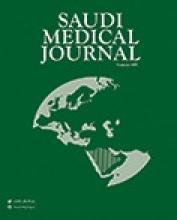Research ArticleOriginal Article
Open Access
Students’ perception towards the problem based learning tutorial session in a system-based hybrid curriculum
Abdulmajeed A. Al-Drees, Mahmoud S. Khalil, Mohammad Irshad and Hamza M. Abdulghani
Saudi Medical Journal March 2015, 36 (3) 341-348; DOI: https://doi.org/10.15537/smj.2015.3.10216
Abdulmajeed A. Al-Drees
From the Departments of Physiology (Al-Drees), and Medical Education (Al-Drees, Khalil, Irshad, Abdulghani), College of Medicine, King Saud University, Riyadh, Kingdom of Saudi Arabia.
DDS, PhDMahmoud S. Khalil
From the Departments of Physiology (Al-Drees), and Medical Education (Al-Drees, Khalil, Irshad, Abdulghani), College of Medicine, King Saud University, Riyadh, Kingdom of Saudi Arabia.
MD, PhDMohammad Irshad
From the Departments of Physiology (Al-Drees), and Medical Education (Al-Drees, Khalil, Irshad, Abdulghani), College of Medicine, King Saud University, Riyadh, Kingdom of Saudi Arabia.
BEd, PhDHamza M. Abdulghani
From the Departments of Physiology (Al-Drees), and Medical Education (Al-Drees, Khalil, Irshad, Abdulghani), College of Medicine, King Saud University, Riyadh, Kingdom of Saudi Arabia.
MBBS, FRCGP
References
- ↵
- Rehman R,
- Afzal K,
- Kamran A
- ↵
- Khalid BA
- ↵
- ↵
- ↵
- Telang A
- ↵
- Masek A,
- Yamin S
- ↵
- Azer SA
- ↵
- Rakhudu MA,
- Amaize A,
- Useh U,
- Maselesele M
- ↵
- ↵
- ↵
- ↵
- Emerald NM,
- Aung PP,
- Han TZ,
- Yee KT,
- Myint MH,
- Soe TT,
- et al.
- ↵
- ↵
- AlHaqwi AI
- ↵
- Husain A
- ↵
- ↵
- ↵
- ↵
- ↵
- ↵
- ↵
- Koh GC,
- Khoo HE,
- Wong ML,
- Koh D
- ↵
- Callis AN,
- McCann AL,
- Schneiderman ED,
- Babler WJ,
- Lacy ES,
- Hale DS
- ↵
- Nanda B,
- Manjunatha S
- ↵
- Downing K,
- Ning F,
- Shin K
- ↵
- Albarrak AI,
- Mohammed R,
- Abalhassan MF,
- Almutairi NK
- ↵
- ↵
- Dent JA,
- Harden RM
- ↵
- Chung EK,
- Hitchcock MA,
- Oh SA,
- Han ER,
- Woo YJ
- ↵
- Dalrymple KR,
- Wuenschell C,
- Rosenblum A,
- Paine M,
- Crowe D,
- von Bergmann HC,
- et al.
- ↵
- Aarnio M,
- Lindblom-Ylanne S,
- Nieminen J,
- Pyorala E
- ↵
- ↵
- ↵
- Al-Shawwa LA
- ↵
- El-Aziz El Naggar MAA,
- Maklady FAH,
- Hamam AM,
- Omar AS
In this issue
Students’ perception towards the problem based learning tutorial session in a system-based hybrid curriculum
Abdulmajeed A. Al-Drees, Mahmoud S. Khalil, Mohammad Irshad, Hamza M. Abdulghani
Saudi Medical Journal Mar 2015, 36 (3) 341-348; DOI: 10.15537/smj.2015.3.10216
Jump to section
Related Articles
- No related articles found.





